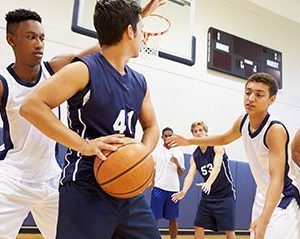- Could Your Grocery Store Meat Be Causing Recurring UTIs?
- Are You Making This Expensive Thermostat Error This Winter?
- Recognizing the Signs of Hypothyroidism
- 10 Strategies to Overcome Insomnia
- Could Artificial Sweeteners Be Aging the Brain Faster?
- Techniques for Soothing Your Nervous System
- Does the Water in Your House Smell Funny? Here’s Why
- Can a Daily Dose of Apple Cider Vinegar Actually Aid Weight Loss?
- 6 Health Beverages That Can Actually Spike Your Blood Sugar
- Treatment Options for Social Anxiety Disorder
America’s Teen Athletes Are Bouncing Back After Pandemic Lows

Before the pandemic, Theodore Kleinman, then a rising high school freshman, was excited to earn his spot on the varsity track team. Aside from staying in shape, he was also looking forward to making new friends and being part of a group.
Unfortunately, COVID shutdowns derailed those plans. Now, as a junior, the New York City teen is finally back on track — literally and figuratively. “I feel so much better now that I am running and participating in meets regularly,” he said.
Now, a new survey shows that Kleinman is not alone: Many teen athletes reported feeling depressed or anxious when sports were canceled during the early days of the pandemic, but many are feeling better physically and mentally now that they are playing sports again.
“We had known about the benefits of sports participation for children for a long time, but COVID-19 really reinforced how important sports are for both mental and physical health,” said study author Dr. Drew Watson. He’s a pediatrician and sports medicine physician at the University of Wisconsin School of Medicine and Public Health and team physician for University of Wisconsin Athletics.
“While the initial restrictions during the lockdowns appeared to have significant impacts on mental health in young athletes, those who have been able to return report much better mental health and physical activity than those who haven’t,” Watson said.
When sports were canceled, teen athletes reported less exercise, a poorer quality of life and high rates of anxiety and depression, the survey showed.
One year later, the athletes who were able to return to sports reported getting a lot more exercise and having a better quality of life. The number of kids who reported moderate to severe anxiety or depression was cut in half once they returned to sports.
Still, the levels of anxiety, depression and quality of life remained worse than before COVID-19. “While returning to sports appears to have important benefits, mental health is going to be a vitally important priority among young athletes beyond the COVID-19 pandemic,” Watson said.
Athletes who didn’t return to sports in 2021 had persistently low levels of physical activity and quality of life, and slightly worse levels of anxiety and depression compared to spring 2020, the survey showed.
“We can all work to encourage the development of infrastructure that promotes physical activity, the prioritization and funding of physical education in schools, and the support of community-based programming that reduces barriers to access,” Watson said.
The findings were presented tomorrow at the American Academy of Pediatrics annual meeting, in Anaheim, Calif. Findings presented at medical meetings should be considered preliminary until published in a peer-reviewed journal.
Dr. Rebecca Carl is a pediatrician and sports medicine physician at the Institute for Sports Medicine at the Ann & Robert H. Lurie Children’s Hospital of Chicago. She agreed that getting kids back on the field is important for their physical and mental well-being,
“For children and adults, sports and physical activity are big stress relievers so having them stop doing those things was certainly a stressor,” said Carl, who has no ties to the new research.
Team sports and group fitness classes provide important social outlets for kids, she said. “Kids really need sports for their physical and mental health,” she added.
More information
The American Academy of Pediatrics offers tips on how kids can safely play sports during the ongoing COVID-19 pandemic.
SOURCES: Andrew Watson, MD, pediatrician, sports medicine physician, University of Wisconsin, School of Medicine and Public Health, Madison; team physician, University of Wisconsin Athletics; Rebecca Carl, MD, Institute for Sports Medicine, Ann & Robert H. Lurie Children’s Hospital of Chicago; AAP 2022 National Conference & Exhibition, Anaheim, Calif., Oct. 7-11, 2022
Source: HealthDay
Copyright © 2026 HealthDay. All rights reserved.










